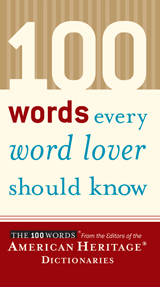
|
|
aesthetic or esthetic alchemy allegory anachronism anathema bailiwick beleaguered bromide cappuccino caprice caribou chiasmus chortle coccyx crescendo cruciverbalist desultory detritus didjeridoo or didgeridoo ebullient echelon egregious ephemeral epicure ersatz facetious fecundity focaccia fusty gemütlichkeit glossolalia gossamer gravamen halcyon |
hiatus humuhumunukunukuapuaa iconoclast insouciant interloper internecine inveigle jeremiad juxtaposition koan laconic lagniappe leprechaun litotes lucubrate magnanimous maharajah or maharaja malapropism meretricious mesmerize meticulous milieu mitochondrion nemesis nictitate nostrum nudnik also nudnick obloquy obstreperous oxymoron palaver pejorative precarious prestidigitation preternatural |
quark quixotic redolent repugnant rubric sang-froid or sangfroid sarcophagus schwa serendipity sesquipedalian shaman sinecure snakebit also snakebitten soporific succotash susurration syzygy tantalize theory timbre troglodyte ullage umlaut vicissitude visceral voluptuous wassail xerophyte yogh Zeitgeist zenith |
Suggested Rules for the American Heritage® Team Spelling Bee
1. Teams shall consist of two or three members, one of whom will be designated captain and responsible for delivering the final spelling of the word.
2. The judge is in complete control of the spelling bee. His or her decision shall be final on all questions.
3. The Bee Master will pronounce the spelling word, read its definition, use it in a sentence (this is optional), and pronounce the word again. Once the Bee Master has completed the above, the team has forty-five seconds to talk and start to spell the word out loud.
4. Team members may confer as to the spelling of the word and may use pencil and paper to work it out, but the final spelling must be given by the team captain, unless he or she designates another teammate to answer.
5. Having started to spell a word, a team shall be given no opportunity to change a letter once it is pronounced out loud. Retracing is permitted, but the same letters once pronounced must be used in the same order.
6. No team shall be disqualified for failing to indicate a capital letter or pronunciation marks, such as hyphens or apostrophes.
7. Any team that fails to spell a word correctly must drop out of the contest and another word shall be given to the next team in line.
8. Any question relating to the spelling of a word must be referred to the judge immediately in writing. A team must make a protest before they receive their next word. When two teams remain, all protests must be made orally before the other team has started to spell the word given to them.
9. The procedure changes when the teams are reduced to two. As soon as one team misspells a word, the other team shall immediately be given an opportunity to spell it. If that team spells the word correctly, they shall be given another word. If that word is spelled correctly, they shall be declared the champions.
10. If one of the last two teams errs and the other team, after correcting the error, misspells the next word given to them, then the misspelled word shall be given to the first team for correction. If the first team corrects the error and spells the next word on the Bee Masters list correctly, they shall be declared the champion.
11. If both teams misspell the same word, both shall continue in the contest, and the team who misspelled the word first shall be given a new word.
12. All words are taken from lists compiled by American Heritage editors and can be found in The American Heritage® Dictionary of the English Language, Fourth Edition, which is the official spell-check dictionary for the bee.







